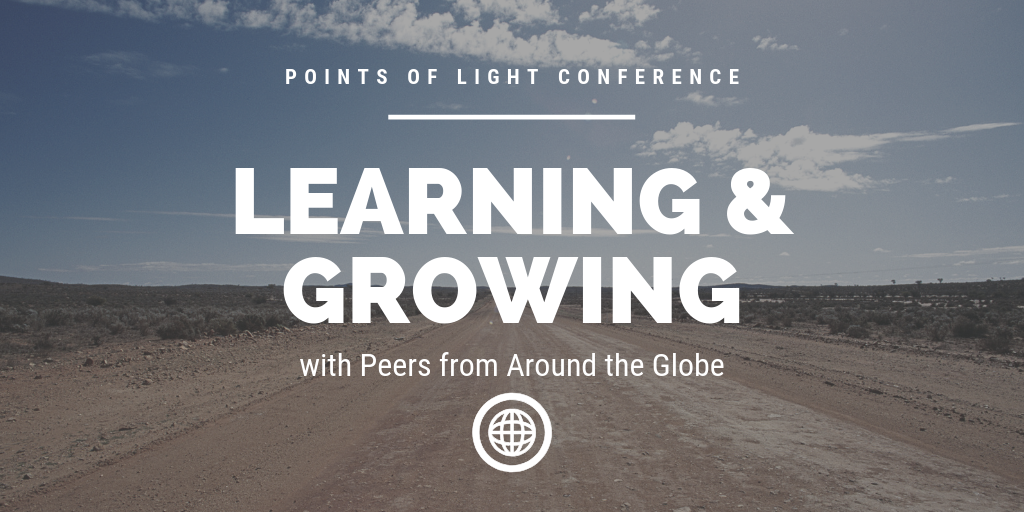
I had the pleasure to participate in my first Points of Light conference last month in St. Paul Minnesota. What an experience it was to connect with people from around the world who are all working to support and enhance community through giving and volunteering!
The changing nature of giving and volunteering was front and centre throughout the conference. Points of Light CEO Natalye Paquin kicked of the conference with a challenge to attendees: “What would the world look like in your community if there were no sidelines, no barriers to entry for people to get involved, to lead and lend support to the causes they care about?”. She invited us to look beyond traditional volunteering and approaches and to consider engagement in all its forms, how and where people spend their money, choose to vote, engage online around causes they care about, start a social enterprise and choose to work.
With that challenge, I set off to the sessions, some I had pre-selected and some I switched on the fly.
The American Red Cross guided us through a journey into the future and how speculative scenarios can and should inform how we organize ourselves and our efforts to respond and adapt to the change that is happening all around us. Using a futures in foresight methodology, we took a non-linear look at the future, recognizing that the future may not be predictable, but examining alternative possible futures can help steer our efforts towards a future we desire.
Lesson: There are signals of change all around us (e.g. cashless society). If we don’t pay attention and adapt, we will be left behind.
Gregg Petersmeyer shared findings from his research of over 200 Points of Light award recipients on what traits prepared them for service, which events triggered them into action, what benefits sustained them and what behaviour supported their success. Being asked to help was among the list of triggers to action that he identified.
Lesson: Don’t underestimate the power of a question.
I learned about the characteristics and values across different generations and how these can and should inform volunteer recruitment and retention program design as Ken Culp from the University of Kentucky walked us through Understanding Generational Differences. The events in time (e.g. war, market crash, age of the internet, industrial revolution) and values of the day (e.g. stability, reputation, teamwork and collaboration) shaped the lives of each generation and as a result, the kind of volunteer work they are drawn to and types of rewards they appreciate.
Lesson: Important reminder that one size doesn’t fit all and the importance of getting to know your volunteers.
I had the pleasure of attending the culmination of the youth summit where teams of young leaders shared their ideas for creating change in their communities and reminded us all that they are not the future, they are the now. They challenged all of us to work with them, side by side, to make our communities a better place and not to hand off our mistakes, broken systems and wicked problems to the next generation.
Lesson: We are in this together and we all have something to contribute.
A hearty panel discussion on civic engagement reminded us of the significant loss of trust in our institutions and organizations and how language and terminology can be a barrier to participation. The expertise and knowledge that lives in our communities, in the experience of citizens is often lost in the theoretical debates and simplification of complex narratives.
Lesson: The ‘how’ of civic engagement has and continues to change, but its importance is greater now more than ever.
Kelly Lovell, a young entrepreneur from Canada (yay: fellow Canadians in the house!) challenged and advised us to find new ways to engage millennials beyond education and awareness, towards action. She walked us through her current endeavor to engage millennials into action that leverages technology, gamification, and the global framework of the United Nations Sustainable Development Goals to spark action.
Lesson: Awareness may be a first step, but action is what creates change.
I also had the opportunity to present on the Value of Volunteering. There are more ways to determine the value of the volunteers that contribute to our communities than the number of hours they give or the economic value they generate. When we take a moment to evaluate all the ways that volunteer contribute to our organizations, our neighbourhoods, our businesses and our society, while also generating value for themselves, it is truly mindboggling to think of the depth and breadth of what they bring to the table.
I was reminded of this value, in all its shapes and sizes throughout the conference. That no matter where in the world you find yourself, you can be sure to find people giving their time, treasure and talent to support causes they are about, people in their community and society at large. I left the conference feeling inspired, challenged to do better and supported through a global community of peers.
